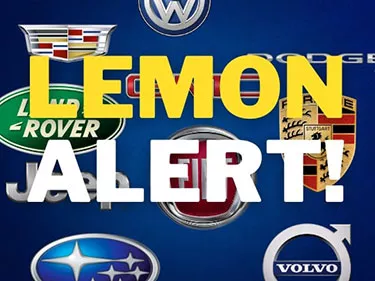
Be Careful Buying or Leasing These 10 Vehicle Brands
Every year, over 150,000 auto consumers in California find themselves in possession of vehicles that fail to meet manufacturer standards. Auto defects range from burdensome to hazardous for both the vehicle’s passengers and others on the road.
With well over hundreds of thousands of vehicles sold and leased every year, there is always a chance that you could end up with a vehicle that requires multiple visits to the repair shop.
These defective vehicles are known as “lemons” and according to specific state lemon laws, consumers who have them are entitled to cash, a refund, or a replacement vehicle.
Nearly every automaker has sold a vehicle with faulty components at some point. Certain vehicle brands, however, seem to perform better than others when it comes to producing lemons. If you are in the market for a new or used vehicle, you should do extensive research before purchasing from the following auto brands, or you may end up with a lemon yourself.
Below are ten auto manufacturers names that have historically had high numbers of reported lemons and consumer complaints:
Stellantis
Three brands produced under Stellantis (previously Fiat-Chrysler Automobiles) that are no strangers to lemon law claims are Jeep, Dodge, and Fiat. Jeep produces about one lemon for every 100,000 vehicles produced. In 2020, Jeep was hit with a lawsuit involving the Jeep Wrangler 4xe, a plug-in hybrid vehicle.
Plaintiffs accused the automaker of selling vehicles with defective electrical systems that result in life-threatening malfunctions. They say that FCA knowingly concealed these defects and failed to issue any relevant recalls. Unfortunately for the Jeep brand, the new Wrangler is not the only car model plagued by consumer complaints.
Owners and lessees of Jeep Compass, Cherokee, and Renegade cars have also filed lemon law claims as the car brand is notorious for powertrain issues, ranging from failure to start to other engine and transmission symptoms.
As for Dodge, the vehicle most often reported as lemons are the Durango, Caravan, Charger, and the Dart. Sold as the Fiat Viaggio in some non-US markets, the Dart has been seen in several lemon law cases. Common problems consumers experience with the Dodge Dart include engine stalling, fast battery depletion, and excessive oil consumption. About one out of every 400,000 cars sold by Dodge are presumably lemons.
Within the Stellantis portfolio, Ram fares better than Dodge with approximately one lemon for every 800,000 vehicles. The pickup truck label saw sales rise slightly in 2021 after selling 569,388 units of its Ram Pickup, the second most-purchased vehicle of the year. The more vehicles a brand sells, however, the more likely it is that some customers will end up buying or leasing vehicles that are not fit for use.
Despite being one of the most popular pickup trucks in the United States, the Ram 1500 alone has been the subject of countless complaints and recalls. Recently, Ram recalled several model year Ram 1500, 2500, 3500, and Classic cars for a defect that causes their side curtain airbags to explode.
When it comes to lemons produced, Fiat is the worst-performing car by Stellantis on AutoGuide’s 1st annual lemon list , with one reported lemon for every 76,808 Fiat cars produced. The Italian carmaker’s numbers are much higher than the industry average of one lemon for every one million cars produced. Known for their small, compact cars, Fiat sells hundreds of thousands of cars annually in the United States alone.
With the high volume of vehicles sold and built by Fiat, several of their cars enter the market in imperfect condition. Common warranty problems with Fiat models involve transmission issues, gas leaks, and clutch failure. Some recent Fiat lemons include 2013-2018 years of the following models: 500, 500C, 500L, 500X, 500 Pop, 124 spider, and 500e.
General Motors
As one of the leading auto manufacturers in the United States, General Motors sells under core brands Buick, Cadillac, Chevrolet, and GMC. Despite sale declines following the onset of the pandemic, GM made up over 18% of all vehicles purchased in the United States. Despite popularity among consumers, not all GM owners have received safe and reliable cars.
The automaker has dealt with manufacturing woes and numerous recalls for a variety of top-selling models, often due to engine issues. Since 2016 for instance, countless Cadillac, GMC, and Chevrolet drivers have dealt with the Chevy Shake defect that causes their cars to violently shake while driving above 35 miles per hour.
Of GM’s brands, GMC, Cadillac, and Chevrolet are particularly prone to lemon lawsuits. Some of the models most involved in lemon law claims include the GMC Sierra, GMC Yukon, Cadillac CTS, Cadillac STS, Chevrolet Cobalt, and the Chevrolet Equinox.
Between these three brands, Cadillac is GM’s top lemon producer. One in every 103,167 Cadillacs are a lemon, contrast this with GMC (one lemon for every 400,000 vehicles) and Chevrolet (one lemon for every 840,000 vehicles).
Volkswagen AG
Volkswagen Group sells passenger cars under the names Audi, Bentley, Bugatti, Cupra, Jetta, Lamborghini, Porsche, and Volkswagen, among others. The automaker has maintained the largest market share in European sales for over twenty years. Despite consistent success and sales, two car names from manufacturer’s portfolio consistently appear in numerous lemon law claims: Porsche and Volkswagen.
Porsche is right behind Fiat and Cadillac as one of the car brands that produces the most lemons, with one defective vehicle manufactured for every 126,000 units sold. Popular models such as the 718 Boxster, Macan, Panamera, and Cayenne have all been subject to several recalls and technical service bulletins (TSB’s). Some known recurring problems with new Porsche cars include engine noise, illuminated check engine lights, and fluid leaks.
Faring slightly better within the German automaker’s portfolio is Volkswagen, with one lemon produced for every 202,000 vehicles. The vehicle brand has been lauded by consumers for its engineering feats. However, many VW drivers have poor experiences with several vehicle models, such as the Atlas.
Over 50,000 Atlas vehicles were recalled at the end of 2021 due to inadvertent airbag deployment caused by water leaks. This marks the 10th recall of the midsize SUV alone, as other drivers say the Atlas has defective seat latches that place second-row passengers in danger. Other VW vehicles that have received numerous complaints are the Jetta, Passatt, and the brand’s most recognized nameplate, the Beetle
Subaru
Subaru is a Japanese automaker known for its extensive portfolio of automobiles, from sports cars to off-road vehicles. Despite rave reviews about models such as the Forester and the Outback, not all Subaru cars arrive well-made from the factory. For approximately every 259,000 Subaru cars produced, at least one may be a lemon.
The car brand’s newest model, the Ascent, has already become the subject of numerous complaints. Subaru’s latest offering was featured on a list of the 10 least reliable cars of 2021 released by Consumer Reports with a reliability score of just 18/100.
Subaru has implemented various recalls on the 2019 Ascent due to transmission problems and defective components that can cause engine failure. Other issues with the Ascent include malfunctioning fuel pumps and failure to start.
Land Rover
Land Rover is a British car manufacturer known for their high-performance engines and luxurious interior stylings, attracting thousands of customers worldwide. The Land Rover is one of several luxury sports utility vehicles built by Jaguar Land Rover. Despite being synonymous with luxury and off-road capabilities, the Land Rover is not always a reliable vehicle that lives up to expectations. One out of every 328,000 Land Rover cars will have lemon issues within their warranty periods. Common concerns with models such as the Land Rover LR4 are steering misalignment, failure to start, and malfunctioning electrical systems.
Volvo
Swedish carmaker Volvo is often a popular choice among consumers. Several Volvo models hold the “Top Safety Pick Plus” designation by the Insurance Institute for Highway Safety. Additionally, Volvo offers customers variety in its lineup of coupes, SUVs, and sedans.
Despite the car brand’s popularity and sales, its cars are not immune to breakdowns due to manufacturing defects. One in every 409,000 vehicles produced by Volvo will be a lemon.
That is twice the industry average of one lemon per one million vehicles produced. Owners of Volvo S60, XC40, XC60, and V90 have experienced a host of issues, from transmission system failure to overheating brakes.
Get in Touch with One of Our Experts Today!
Purchasing or leasing a vehicle by one of these auto brands does not necessarily mean your car is a lemon. However, we highly recommend that you do plenty of research beforehand. If you do find yourself in possession of a lemon, we urge you to stay informed about your rights as a consumer under the California Lemon Law.
Stay updated with recent recalls and consumer complaints involving your vehicle. You should also be documenting as much information as possible if you take your car in for repairs during the warranty period.
If you believe that you own a lemon, reach out to one of our Lemon Law Experts today. With a quick, free, and confidential assessment, we will first determine if you have a viable lemon law claim.
You can be certain that our team will be able to help you throughout the process. Remember, large auto manufacturers use attorneys who know lemon law inside and out and it is important that consumers seek the same level of expertise.
Our sole focus is lemon law so you can be confident that your attorney will be highly skilled and up to date on the latest in California Lemon Law. Get the compensation you deserve. Contact us today.





